
Iran: Human Rights Council must convene a special session
Fifty organisations urge the UN Human Rights Council to urgently convene a special session to address an unprecedented escalation in mass unlawful killings of protesters in Iran.
© Illustration: Badiucao

A sustained crackdown deserves a sustained response, said global NGOs today. In a joint letter, they call on Member and Observer States of the UN Human Rights Council to speak out about the ongoing violations against human rights defenders in the country and to hold the Government of China - recently re-elected to the Council - accountable for its failures to respect human rights.
In a concerted effort since the early months of the Xi Jinping administration, the Chinese Government has suppressed civil society activity, criminalised human rights defenders and ignored its international human rights obligations.
On 16 February 2016, the UN High Commissioner for Human Rights Zeid Ra’ad Al Hussein released a hard-hitting statement on China, citing a ‘very worrying pattern’ of detentions, disappearances, and forced and televised confessions of human rights defenders, in particular lawyers. Zeid also raised concerns about a legislative framework that rolls back fundamental freedoms – the right to freedom of expression, association, assembly and belief – in the name of ‘national security’.
In reaction to this statement by the UN’s top human rights official, some governments decided it was time to take China to task. The joint statement, on behalf of twelve states, was the first time in a decade such collective action had been taken to raise human rights concerns in China.
Says Sarah M Brooks, Asia programme manager at ISHR: ‘The High Commissioner’s statement last year was clear: he called for the unconditional release of human rights defenders. Over a dozen governments followed suit. But the response from Beijing was equally clear: that even due process rights and basic dignity for human rights lawyers and their families are off the table, not to mention unconditional release’.
Rather than take seriously these calls for reforms, the Chinese Government attacked the High Commissioner’s statement as ‘groundless’, ‘unjust and unprofessional’. And they kept up these practices, ranging from the regular use of detention to silence dissent, to the extraordinary – and ongoing – harassment of the family members of detained human rights lawyers, such as Li Heping and Wang Quanzhang. A report released yesterday by the Network of Chinese Human Rights Defenders highlights in great detail these worrying trends.
A range of global and regional non-governmental organisations have decided that twelve months’ silence in Geneva is enough.
These groups sent a joint letter yesterday to Permanent Missions to the UN in Geneva, asking governments to sustain the call for accountability of the Chinese Government by making a second joint statement, and by coordinating national statements, at next month’s meeting of the UN Human Rights Council.
Specifically, the letter calls for countries to benchmark progress – or regress – by the country, using both the UN and joint government statements from last year. The letter also outlines new challenges, including the widely-reported allegations of torture of detained lawyers, and the sustained pressure put on independent media, bloggers and activists who use their websites to report on human rights abuses.
The organisations emphasise that this is justified not only because of the dire situation facing defenders, but because of China’s heightened responsibility to change its behaviour.
‘It was a disappointment to see China re-elected to the Human Rights Council last October with an enormous amount of support’, says Ms Brooks.
‘The international community can stand by as China wilfully misinterprets this as a mandate to violate human rights with impunity. Or, they can stand up, speak out, and make clear that as a Council member, China is bound to uphold the highest standards of human rights, and that its peers – and its people – expect nothing less’.

Fifty organisations urge the UN Human Rights Council to urgently convene a special session to address an unprecedented escalation in mass unlawful killings of protesters in Iran.

The Escazú Ahora Chile Foundation, the Protege los Molles Foundation and ISHR demand that the investigation, arrest and legal proceedings involving Julia Chuñil's relatives be conducted in accordance with international standards of due process.

At a time of financial strife and ongoing reform for the organisation, States have adopted a 2026 budget cutting 117 jobs at the UN’s Human Rights Office. The final budget endorses proposed cuts that disproportionately target human rights, imperilling the UN’s ability to investigate grave abuses, and advance human rights globally.